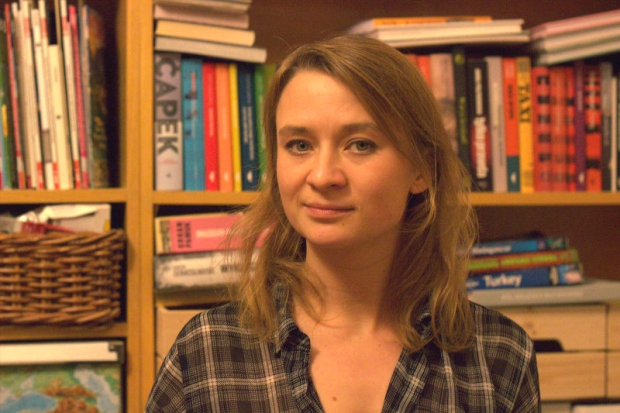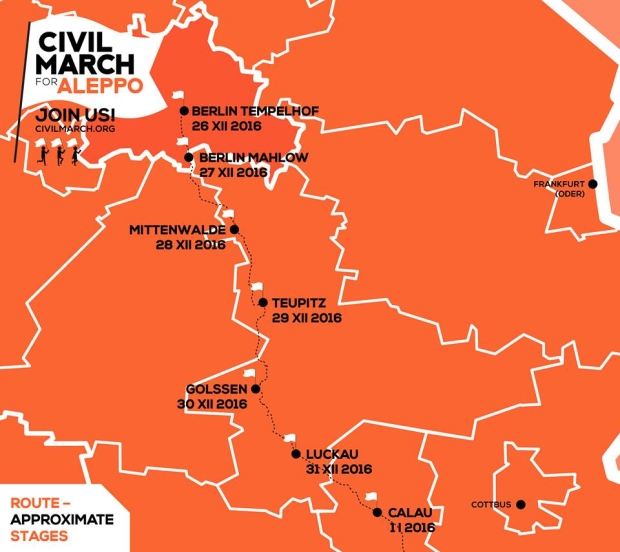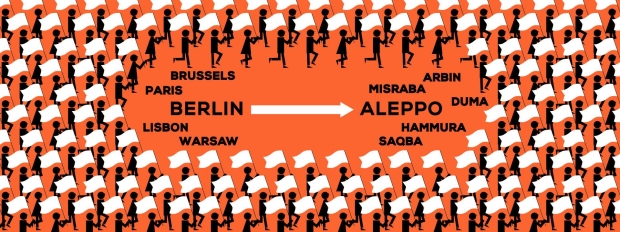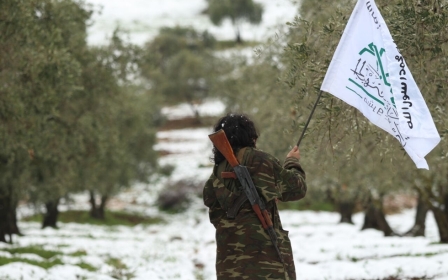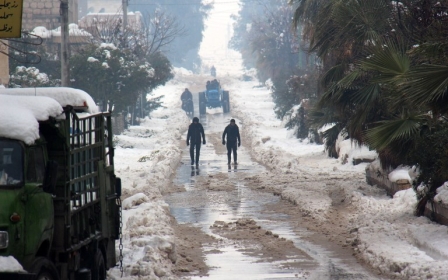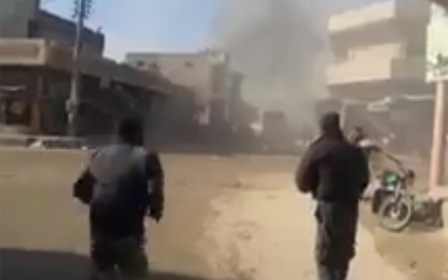Marching to Aleppo: Berliner leads mass peace march to Syria
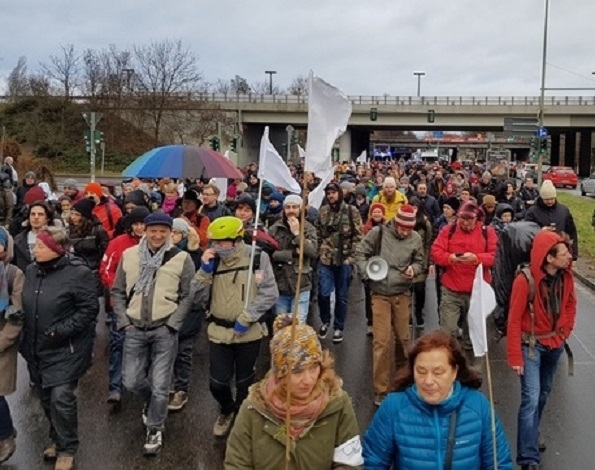
BERLIN, Germany - “This was the hardest week of my life,” Anna Alboth said, as she took a sip of water and sat down on the floor in her Berlin apartment in mid December.
In the room next door, her two girls, Hanna and Mila, were playing with their grandmother. The room is crammed with ceiling-high bookshelves. Outside the big windows the city is preparing for Christmas.
'I am scared of the responsibility of the health and life of such a big group. Many people come because they believe in me. That is beautiful, but also scary'
But this year Alboth, a Polish journalist who lives in Berlin with her German photographer husband, played no part in the festivities because her mind was focused elsewhere. She is the organiser of the Civil March for Aleppo. While others were sitting around the dinner table with their families, Alboth and others from all over Europe were preparing for a month-long walk from Berlin to Syria.
They plan to walk through Germany, the Czech Republic, Austria, Croatia, Serbia, Macedonia, Greece and Turkey - the Balkan route backwards - 20 kilometres a day in freezing temperatures, with the aim of sleeping in tents and sports halls. The journey is expected to take over three months.
“I don’t want to see pictures of children in bombed hospitals anymore,” Alboth said, and with this conviction she has turned her home into a headquarters, offering support for refugees.
How it all started
Anna and husband Tom, who have long been involved in activism and youth work, run an award-winning blog titled, Family Without Borders.
However, since Germany opened its borders to refugees in the summer of 2015, their lives have changed, as they now share their flat with Akil, a Syrian from Aleppo.
In the overflowing kitchen of the Polish-German couple, they have collected donations and organised several picnics for refugee women, and Anna has developed a huge network of Syrians around her. She is familiar with the hardships and the stories of loss, but one day back in November it became just too much for her to bear.
While sitting in a shelter with a Syrian family, phones with photos were being passed around showing recently deceased friends and relatives. After returning home that evening, she watched all the videos coming out of Aleppo on the news.
"I have many friends who say they do not watch them anymore, because they are too graphic. But I let myself watch them all and I see my kids in these children."
To vent her emotions, she went where most young people go to express themselves: Facebook. What followed was a post that sparked a movement. “Let’s march to Aleppo. We need to do something,” she wrote. “Some limits of mine were just broken.” The response she got was overwhelming.
'Messages from friends, from people all over Europe, all over the world started pouring in. They all said the same thing: If you go I go with you'
Many people were affected by Alboth's passion to take action to help the Syrians and decided to join the organising team, like Joana from Portugal and Ewa, a lawyer from Warsaw, who helped the group deal with legal concerns.
Others like Paulina assisted the team with logistics and organised medical teams.
Stefan Oeknigk, a project manager with experience in humanitarian support, lives in Poland and is walking together with his wife.
"Many shared this feeling of powerlessness and when Anna said it is enough, let’s do something, however crazy it sounded, it was liberating that someone said stop," Oeknigk said.
“I did not expect such a passionate response,” Anna says. “I was like holy s***. This is happening.” Within days, she decided she would move forward with the organisation and became the head of a civil movement now involving more than 2,600 people joining the march.
A total of 130 local NGOs offered support to those participating in the march, including food, logistics and sleeping arrangements.
Her seven-year old daughter Hanna told her classmates at school: “I am going to Aleppo.”
The march started on Monday 26 December close to the biggest German refugee shelter, Tempelhof.
'The walk is pointless and naive'
“We have thousands of doubts,” Alboth said. Many things needed to be organised in a very short space of time.
Shortly after a Facebook group and crowdfunding campaign were created, questions started flooding Anna’s inbox. "How can we support [the march]? Can we bring our kids? Where will we sleep? What is the route? Do we need tents? Who is paying you? Are you crazy?"
Routes were planned, but there were many security and administrative questions.
“We have lawyers in every country to check what documents and permits are needed,” says Tom, her husband, who usually runs an internet agency. He is currently driving the first part of the route by car to check the roads. Turkey is still an open and scary question.
“I can't worry about how it will be in Turkey. We have a team working on different scenarios," Alboth said.
The biggest obstacle are not logistics, it is people trying to portray the march as political
The biggest obstacle are not logistics, it is people trying to portray the march as political, according to Alboth. Messages were posted on Facebook saying the march is pointless, naive, dangerous and insane.
Others said that it would be best for Alboth and her team to send humanitarian aid in the form of goods, rather than organising a march.
Organisers said that the march was open to everyone, but they would only allow white flags to be carried during their walk, to avoid affiliation with any political group.
“It is a civil movement, I do not want to see people killed in such a horrible way anymore,” Alboth said, stressing that they are not affiliated with any organisation or party.
Anna received a lot of support from Aleppo, while still under siege, with different people calling her, and sending messages and videos.
On 16 December, an unnamed citizen sent a video message to the group saying: “This is the greatest idea that I have ever heard of and thank you for everything.”
When the Syrian army announced on 22 December that it had gained full control of Aleppo, the group began to walk regardless.
Alboth said that there is still no peace and there is a shortage of doctors and hospitals, while other cities are still facing the same ordeal. Instead of only highlighting Aleppo, the banner on their Facebook page now reads: Aleppo, Saqba, Duma, Arbin, Misraba, Hammura.
From powerlessness to action
In 2011, Syrian President Bashar al-Assad cracked down on pro-democracy protesters, sparking a civil war. Islamic State (IS) group militants used the chaos to seize territory in Syria and Iraq, and at least half of Syria's 22 million people have been uprooted. In the last five years more than 400,000 have been killed.
Assad's forces, backed by Russian warplanes and Iranian support, battled to recapture eastern Aleppo, which marked a sobering loss for the rebel forces in Syria. Civilians were subjected to grave human rights violations during the takeover of Aleppo. Last week, thousands of civilians were bussed out of eastern Aleppo after a landmark evacuation deal was brokered.
Alboth's initiative has ignited passion among the people who are walking with her and those they are marching for. It has transferred the feeling of powerlessness into action, according to Alboth.
“I want to let people change this feeling into something,” Anna said. Her flat mate Akil, a Syrian, is walking with her, back through the route he used to get to Germany, a powerful symbol, according to Alboth.
This is yet another challenge for the organisers of the march, as many refugees with unclear status want to join the walk along the route.
“If the march is going through the country in which you stay legally, join us. But if you don't have a visa for other countries, please don't risk by joining us," the group's facebook page stated.
Big responsibility
These are the things that worried Alboth shortly before it all started.
“I am scared of the responsibility of the health and life of such a big group. Many people come because they believe in me. That is beautiful, but also scary," she said.
Her five-year-old daughter Mila runs into the room towards her mother, showing her a drawing she has made. After she leaves, Alboth tells a story.
Mila had told her recently that she was thinking about Aleppo, so she asked her daughter what her thoughts on Aleppo were. “What about Santa Claus, how can he get there?” Mila said. Alboth sent her to sleep and then cried.
Her voice breaks for a moment, when she speaks about how this has affected her life in recent weeks. Mila and Hanna will march with their mother through Germany during the first week. They will then have to go back to school and their grandmother will take care of them, while Alboth continues to march on to Aleppo.
“I do not know how far we will get, how far is it possible,” she said. “But for sure I will start.”
New MEE newsletter: Jerusalem Dispatch
Sign up to get the latest insights and analysis on Israel-Palestine, alongside Turkey Unpacked and other MEE newsletters
Middle East Eye delivers independent and unrivalled coverage and analysis of the Middle East, North Africa and beyond. To learn more about republishing this content and the associated fees, please fill out this form. More about MEE can be found here.


